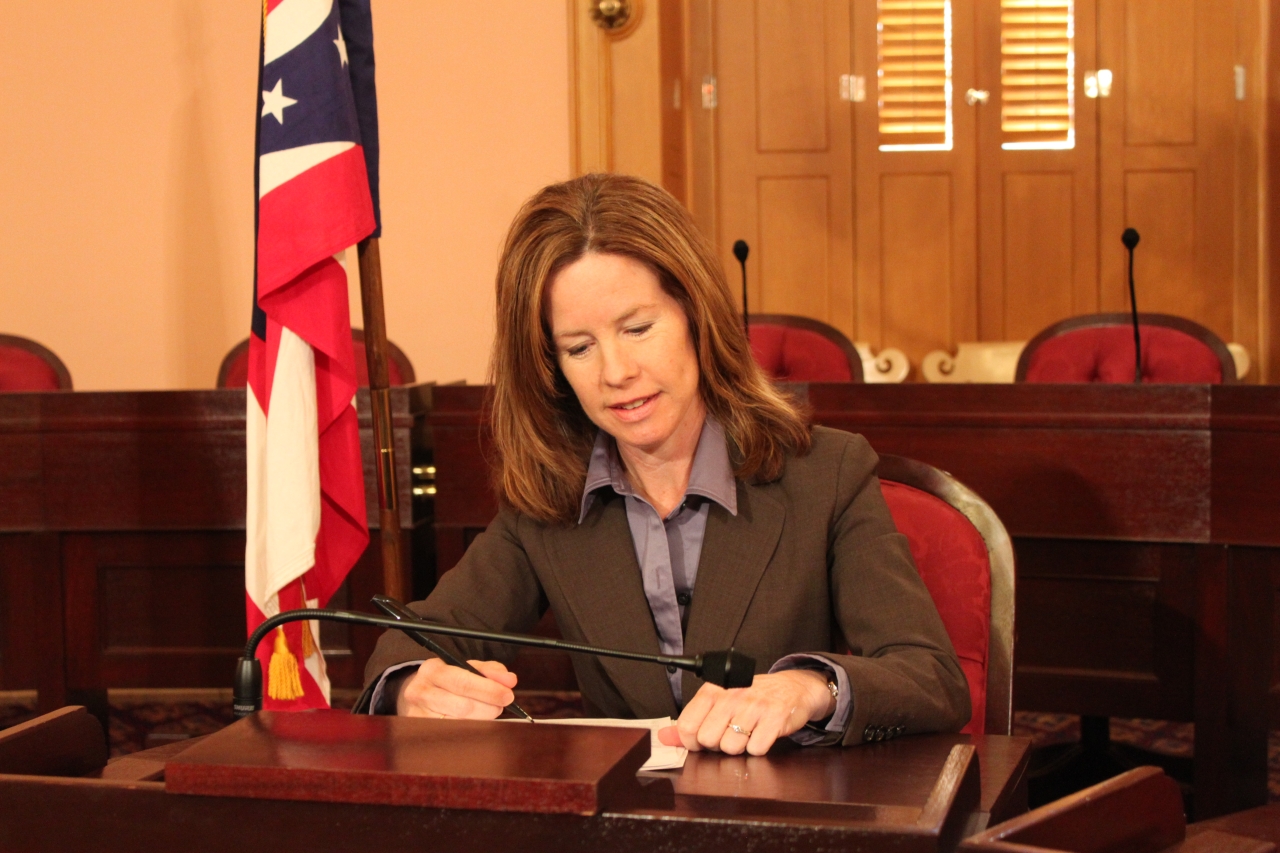Democratic News
Featured Stories
News Feed
State Rep. Teresa Fedor today offered a resolution recognizing April 14th as Equal Pay Day in Ohio. This date points out the inequality that exists in Ohio’s workforce and symbolizes how long, on average, a woman must work into a new year to match her male counterpart’s previous year’s earnings.
State Rep. and Ohio Legislative Black Caucus President Alicia Reece (D-Cincinnati) will attend the National Action Network (NAN) convention in New York today where she will join other elected officials and civil rights activists for four days of panel discussions, workshops and events.
“I am proud to work with so many dedicated individuals through the National Action Network to bring together civil rights leaders in the pursuit of a new era of equal opportunity for all,” said Rep. Reece. “Whether it’s equal opportunity at the ballot box or in the justice system, the board room or the classroom, we are building a movement that recognizes our nation has much work remaining to build a more perfect union.”
National Action Network Founder and President Rev. Al Sharpton will kick off the annual convention with a ribbon cutting on Wednesday followed by a 2016 Presidential Election panel that morning. Panels and workshops will continue in the following days, addressing topics like, women in business, police brutality, crime, homophobia housing and healthcare.
Samaria Rice, mother of slain Ohio youth Tamir Rice, will speak on a victim-centered panel on justice and police, while other panels will include people like, presidential advisor Robert Gibbs, Dr. Ben Carson, actor Anthony Anderson, former RNC Chair Michael Steele, Senator Bernie Sanders and AFL-CIO President Richard Trumka.
Reece will present a “Woman of Power” award to a featured guest during Wednesday’s “When Women Win, We All Win” luncheon.
State Reps. Greta Johnson (D-Akron) and Emilia Sykes (D-Akron) today applauded the Governor’s veto of a student voter suppression provision in House Bill 53, the state transportation budget.
Leading Democrat of the House transportation budget committee, Ohio Legislative Black Caucus President and State Rep. Alicia Reece (D-Cincinnati) today applauded Gov. Kasich for using his veto authority to strike a line in the state’s transportation budget that would have made it harder for college students to vote in Ohio. The provision, inserted into the bill late by Senate Republicans, would have forced students from other states to get a driver’s license and register their vehicles in Ohio within 30 days of registering to vote.
“Thanks to the work of my Democratic colleagues, the governor, voting advocates and students around this state, cooler heads have prevailed and the controversial restriction that would have made it harder for students to vote has been removed from the this bill,” said Reece. “Instead of getting caught up in a legal fight over ballot access, we can continue to focus on jobs and economic development in our state. It’s the right thing to do.”
Reece and the Ohio House Democratic Caucus asked the governor to veto the voting restriction last week. Reece also penned a letter to the governor on her own last week, a copy of which can be seen below.
You can hear Reece’s comments during the House floor debate by clicking the video.
Today, Gov. Kasich signed the state’s $7 billion transportation budget bill, while striking a provision of the bill that would have made it harder for students to vote. Representative Dan Ramos (D-Lorain) was one of 13 Democrats who voted against the Senate changes to the transportation budget after voting for it weeks before.
“Weeks ago I voted for the House version of HB53: an effective, bi-partisan bill. Unfortunately, what came out of the Senate was undermining our fundamental freedom and most basic right in a democracy—the right to vote,” said Rep. Dan Ramos. “Our priority is to encourage talented students to stay in our state after graduation, and this sent the wrong message to those students.”
The vetoed budget provision would have required students who registered to vote in Ohio to surrender their driver’s license if it were from another state, and forced them to obtain an Ohio driver’s license and register their vehicle with the state. Failure to do so within 30 days resulted in a criminal offense.
State Rep. Kathleen Clyde (D-Kent) released the following statement in response to Governor Kasich’s line item veto of the harmful voting provision in the transportation budget:

State Rep. Michele Lepore-Hagan (D-Youngstown) today announced she is supporting an amendment to restore $75,000 dollars in state funding to Youngstown State University to provide internships and co-ops. The appropriation, which had been included in the state’s previous biennial budget for FY 14-15, did not appear in the Governor’s current budget bill.
“Internships and Co-Ops play a critical role in connecting students with potential future employers and providing valuable hands-on workplace experience,” said Rep. Lepore-Hagan. “Higher education should never be a partisan issue, and I am proud to join legislators on both sides of the aisle to push for the restoration of funding.”
State Rep. Alicia Reece (D-Cincinnati) today sent a formal request to Governor Kasich to lower all flags at the state capitol to half-staff today in honor of fallen Cincinnati Fire Apparatus Operator Daryl Gordon.
Gordon died tragically in the line of duty on Thursday, March 26th, while fighting to save residents in the King Towers apartment complex in Madisonville. He is the father of two daughters, a husband, and a 26-year veteran of the force.
Rep. Reece will be joining others to honor his life and service on Wednesday for the funeral procession.
The Ohio House Democratic Caucus today sent a letter to Gov. John Kasich asking him to veto a provision in the state’s transportation budget that would make it harder for students to vote in Ohio.
The provision will require anyone who registers to vote in Ohio to surrender their driver’s license if it is from another state, obtain an Ohio driver’s license and register their vehicle with the state. Failure to do so within 30 days results in a criminal offense.
Students and lawmakers have estimated that this imposes a cost of about $75 to $100 for out-of-state American students to vote for local issues and candidates that carry quality of life consequences for students and the communities in which they live.

The Ohio House of Representatives passed legislation Thursday sponsored by State Representative Denise Driehaus (D–Cincinnati) to allow cities over a certain population to create Outdoor Refreshment Districts.
“It is our goal that these outdoor refreshment areas be used to create another incentive for Ohioans to patronize local businesses,” Rep. Driehaus said. “Ultimately, HB 47 is about creating economic vitality in our communities.”
The bill would allow cities with a population of over 35,000 to apply for Outdoor Refreshment District areas within their cities. Specifically, it would allow cities with a population between 35,000 and 50,000 to create one Outdoor Refreshment District, while cities with over 50,000 would have the opportunity to create two.






